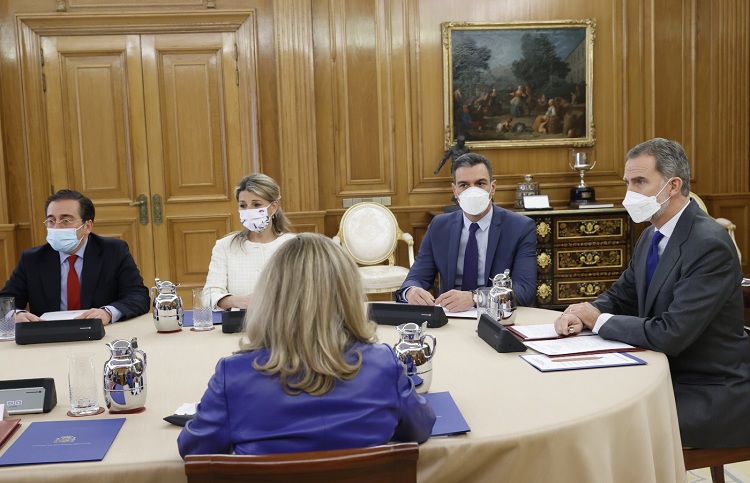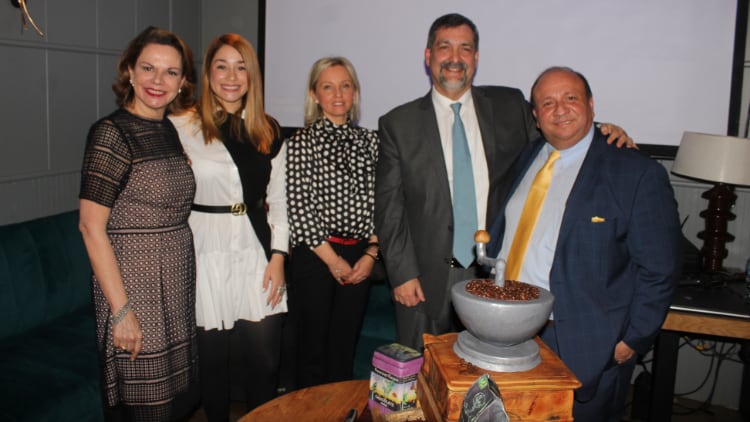The Diplomat
The Government of Pedro Sánchez yesterday “strongly” condemned Russia’s invasion of Ukraine, “a flagrant violation of international law that puts global security and stability at risk”, and expressed its willingness to maintain a joint position with the European Union so that this act “does not go unpunished”.
Immediately after the first information on the offensive ordered by President Vladimir Putin, the Executive issued a note in which it “strongly condemned the military invasion of Ukraine by the Russian Federation”, a “completely unjustified aggression, of unprecedented gravity, and a flagrant violation of international law that puts global security and stability at risk”.
It also assured that the President of the Government “is in contact with partners and allies of the EU and NATO to coordinate a response to the serious situation” and reiterated his “support for the territorial integrity and sovereignty of Ukraine” and his “support and solidarity with the Ukrainian people”.
Subsequently, King Philip VI presided over the National Security Council, the highest advisory body of the Government in security matters, at the Zarzuela Palace to analyze the current situation in Ukraine. The meeting was attended by Pedro Sánchez, the First Vice-President, Nadia Calviño; the Second Vice-President, Yolanda Díaz; the Minister of Foreign Affairs, José Manuel Albares; the Minister of Defense, Margarita Robles; the Minister of Transport, Raquel Sánchez; the Director of the Cabinet of the Presidency of the Government, Óscar López; the Secretary of State for Communication, Francesc Vallés; the Secretary of State for Foreign Affairs, Ángeles Moreno; the Chief of Defense Staff, Teodoro Esteban; the Secretary of State Director of the CNI, Paz Esteban; the Secretary of State for Security, Rafael Pérez Ruiz; the Secretary of State for Trade, Xiana Méndez; the Director of the Department of National Security of the Presidency of the Government, Miguel Angel Ballesteros; and (by telephone) the Minister of the Presidency, Félix Bolaños.
At the end of the meeting, Pedro Sánchez read an institutional statement in which he again condemned the “unacceptable” military attacks by the Russian government of Vladimir Putin in Ukraine. “The facts are very serious and very simple at the same time: a nuclear power has violated international legality and has begun the invasion of a neighboring country, while threatening retaliation against any other nation that comes to the aid of the attacked country,” he said. This is “a flagrant violation of international law, of Ukraine’s national sovereignty and territorial integrity” that “must not go unpunished” and represents “a frontal attack” on the values that have provided Europe with years of prosperity and stability, primarily “peace,” he continued.
“Two paths are open: that of peace and institutional legality or that of world disorder and insecurity,” he warned. “The decision is simple,” he continued. “Spain will defend international legality, will go out of its way to restore peace and will show solidarity with the populations affected by the conflict,” Sánchez assured.
The European Union, he recalled, is going to help Ukraine with financial aid, with “important investments” and with “health material to protect the welfare of the Ukrainian people”. Likewise, and in order to “stop as soon as possible” this aggression, the EU has already approved a first package of sanctions against Russia. “The conflict will undoubtedly have an impact on the Spanish and European economy” and, therefore, the EU “has been preparing the response for some time” to take “as many measures as necessary to mitigate the economic and energy impact”, he said.
Likewise, Pedro Sánchez assured that he had informed the leader of the opposition, Pablo Casado, about the situation and announced that next Wednesday he will appear before the Congress of Deputies to report on the evolution of the events in Ukraine.
The President of the Government also indicated that the consular services are in contact with the Spaniards who remain in Ukraine to provide them with information on ways to leave the country “when the situation allows it”. Besides, the Spanish Embassy in Warsaw remains “on alert” to provide the necessary logistical support. Precisely, the Ministry of Foreign Affairs yesterday renewed travel recommendations to Ukraine. “It is recommended not to travel to Ukraine under any circumstances. Spaniards in the country are advised to limit their movements as much as possible, remain in contact with the Spanish Embassy in Kiev and follow the instructions of the local authorities,” warned the Department of José Manuel Albares.
A convoy with more than 50 Spaniards
Albares announced on TVE last night that the government is making convoys available to Spaniards living in Ukraine to leave the country, and said that a convoy will leave this Friday with more than 50 people who will be accompanied by embassy staff.
The MInister added that there are still “a little over 200 Spaniards” in Ukraine, who have been called “on several occasions” and “have been offered the possibility of leaving”, although several of them have expressed their wish to remain in the country for personal reasons.
Political parties
All the political parties, both those of the opposition and those integrated in the coalition government, condemned the Russian military operation unreservedly. The PSOE spokesman in Congress, Héctor Gómez, described the invasion as “unjustified” and assured that the decisions taken by Spain within the European Union and NATO will be aimed at avoiding the escalation of the conflict and the consequences for the population.
As for Unidas Podemos, the other partner of the Government, the vice-president Yolanda Díaz condemned the “intolerable aggression of Russia” and showed her “solidarity” with the Ukrainian population, the leader of Podemos and Minister of Social Rights, Ione Belarra, expressed “maximum concern and categorical condemnation” and the federal coordinator of Izquierda Unida (IU) and Minister of Consumer Affairs, Alberto Garzón, condemned this “inadmissible” attack by the “imperialist” Vladimir Putin and supported the position of the Government and the European Union.
As for the national opposition, the PP also condemned Russia’s attack on Ukraine and conveyed its support to the Government to give a “firm and forceful” response to this aggression together with Spain’s allies in the EU and NATO, while the party’s president, Pablo Casado, contacted Pedro Sánchez, to reiterate his support to the Executive in the “coordinated response with the EU and NATO”. Another member of the PP, the mayor of Madrid, José Luis Martínez-Almeida, has offered the city to host Ukrainian refugees “while they process their national asylum application”.
For her part, the president of Ciudadanos, Inés Arrimadas, also contacted Sánchez to convey her support and ask Spain to exercise “leadership” within the EU and NATO to give a “forceful, coordinated and intelligent” response to Russia. Vox also condemned Russia’s military attack on Ukraine, asked the Government to work through diplomatic channels to solve the conflict and denounced “the failure and irresponsibility of the European Commission”.
Spain in NATO missions
NATO leaders will hold an emergency meeting today to study measures to reinforce its eastern flank and prepare the response to the Russian invasion of Ukraine. Spain currently has more than 600 military personnel and battle tanks, fighters and navy ships on NATO missions in Eastern Europe.
Specifically, the Air Force has a contingent of four Eurofighter combat aircraft and 130 troops in Bulgaria on an air police mission against Russian incursions. Likewise, Spain has 350 troops and Leonardo and Pizarro battle tanks in Latvia in a NATO border deterrence mission in which it has been participating since 2017 and the Navy has three ships integrated in the NATO Mediterranean and Black Sea groupings, the frigate Blas de Lezo, the ship Meteoro and the minehunter Sella.







